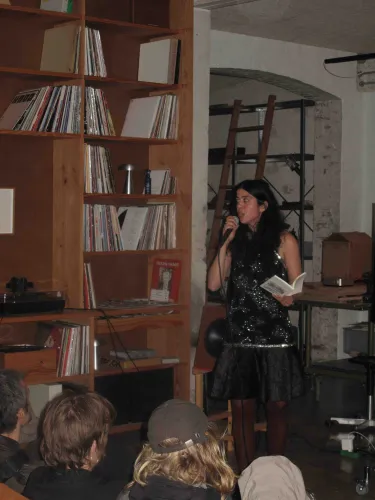INDEX
Asays : Sound As Revolutionary Praxis

In Amazigh tradition, Asays refers to a communal gathering space, often used for music, dance, and oral storytelling. It is a site of collective expression, where trance-inducing rhythms, such as those found in Ahwash, Gnawa, or Diwan traditions, create spaces for spiritual elevation. Historically, Asays also meant a place for strategic discussions and social cohesion, reinforcing the idea that music is integral to social organizing. In this context, this event celebrates the history of music as a vessel for collective transformation. It explores the spiritual and political legacy of sound and by extension electronic music, where rhythms and sonic ruptures become tools for collective resistance and spiritual exploration.
Poetess and performer Zahna Siham Benamor is invited to present a performance drawing from her recent book Se havet som ansigt / اُنظر إلى البحر كوجه / La résurrection des fleurs sauvages, microcosmes in today’s Information. This long poem, published simultaneously in Danish, Arabic, and French, unfolds as a poetic address and a layered meditation on fracture, both political and personal, a split the author inhabits from within.
Positioned between linguistic, cultural, and affective geographies, the work moves without resolution through ambiguity and doubt. No distinction is made between pain and joy, the sacred and the profane, longing and its aftermath. Rather than closure, it offers rhythm as method, chant as movement, poetry as a field of resistance and propulsion. What emerges is not a fixed vision but the trembling outline of a future still in formation.
Throughout the evening, two short films are screened, drawing a continuum between Detroit’s techno legacy and North African trance rituals, shedding light on the deep, ancestral ties between sound, movement, and radical world-building.

@Still from 'Black To Techno' by Jenn Nkiru
Hisham Mayet’s The Divine River: Ceremonial Pageantry in the Sahel (2013) is less documentary than transmission. Filmed across five years along the Niger River, known to the Tuareg and Southern Amazigh as Egerew n-Igerewen, the River of Rivers, the work traverses sonic rituals, devotional ceremonies, and daily gestures. What emerges is not ethnography in the academic sense but a “punk” ethnopoetics, where dissonance is allowed to remain unresolved, and listening becomes a form of witnessing. It is a film that resists containment, opting instead for immersion in the ecstatic, the harrowing, and the untranslatable.
The evening concluded with a DJ set by farmer, NADA acupuncturist and producer Cotton Roach.
About the artists:
Zahna Siham Benamor (b. 1988) holds a bachelor’s degree in French literature and a master’s degree in social sciences, as well as in culture and language encounter studies. As a performance artist, she explores themes of hybridity and rootlessness within an interdisciplinary practice that blends sound, poetry, and performance. She employs techniques of estrangement and dictation to present a contemporary critical perspective on power structures, colonialism, and its repercussions. Prior to her exhibition as part of All all all Tryouts, she has exhibited in the duo exhibition Den Falske Jerikorose at O—Overgaden and has performed at the Setu Performance Festival in Ellient, France, as well as at Arken, Ringstedgalleriet, and Art Hub Copenhagen, among others.
Cotton Roach is a Brooklyn-based DJ, NADA acupuncturist, farmer, and producer, blending raw acid techno with deep, hypnotic rhythms. As co-founder of Outlaw, a renegade party collective, she curates sonic landscapes that fuse underground resistance with ritualistic intensity. Rooted in both somatic healing and sonic disruption, her sets channel a primal energy—where distortion meets transcendence, and the dancefloor becomes a site of collective catharsis. She played at Basement, Paragon, Lot Radio, Hor, and recently the Wire Festival in NYC.
Curated with love at AM Clean Sound by Elia-Rosa Guirous-Amasse